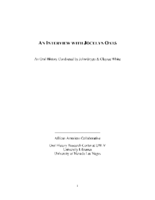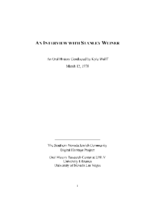Search the Special Collections and Archives Portal
Search Results

Transcript of an Interview with Sonny Thomas by Barbara Tabach on February 28, 2013
Date
Archival Collection
Description
Sonny (Sandy C.) Thomas is from Fordyce AR. He worked in hotels for over 30 years before securing job as funeral director for which he was trained.
Text

Transcript of an Interview with Marcia Washington by Claytee D. White, February 14 and March 14, 2013
Date
Archival Collection
Description
Marcia moved to Las vegas in 1966 as a young teen; became first African American on the State Board of Education (2000-2008)
Text

Transcript from interview with Jocelyn Oats conducted by John Grygo and Claytee D. White, November 20, 2012
Date
Archival Collection
Description
Transcript from interview with Jocelyn Oats by John Grygo. Oats came to Las Vegas with her family and grew up on the Westside. Her father was a leader in the community and a founder of Victory Baptist Church. Her mother provided child care for people in the community. Oats works with Nevada Partners and the Youth Employment for Summer (YES), and reflects on the community in Las Vegas.
Text

Transcript of interview with Eugene Williams conducted by Claytee D. White, July 18, 2008
Date
Archival Collection
Description
Transcript of interview with Eugene Williams conducted by Claytee White on July 18, 2008. Williams discusses his life as a singer with various musical groups including the Coasters and the Platters, and traveling all over the United States and Europe. He left the Platters in 1990 and settled in Las Vegas. He was part of the Sound of the Platters group in the early 2000s.
Text

Transcript of interview with Stanley Weiner by Kyle Wolff, March 12, 1978
Date
Archival Collection
Description
Interview with Stanley Weiner by Kyle Wolff on March 12, 1978. In this interview, Weiner begins by talking about his father's employment, and then his own series of jobs, including as a department manager at Sears. He discusses living in different parts of town, population growth, educational opportunities, transportation, and recreation. The interviewer asks specific questions about sports, hotels, unions, and the weather.
Text

Transcript of interview with Ivory Blue II by John Grygo, February 22, 2013
Date
Archival Collection
Description
Ivory H. Blue II was born and raised Las Vegas, specifically in the Westside neighborhood projects during the 1980s and 1990s. He describes his early childhood and what he remembers as a strong sense of community. Though grade school had its challenges, Ivory excelled in sciences and came under the watchful mentoring of Dr. Eugene McGaugh, a professor at UNLV. Ivory graduated with a master’s degree and has a long career already with NV Energy. Theresa Harris, Ivory’s mother, was from Hawthorne, Nevada and his father, Ivory Blue I, was originally from Edwards, Mississippi.
Text

Transcript of interview with Ray Christian by Russell L. Ellis, March 19, 1978
Date
Archival Collection
Description
On March 19, 1978, Russell L. Ellis interviewed former postal worker, Ray Christian (born 1927 in Las Vegas, Nevada). The two discuss Ray’s family history and his experiences as a Black man in early Las Vegas. Ray Christian compares the experiences of his childhood with that of his children in Las Vegas. The interview concludes with Christian expressing how Las Vegas has grown and that there are more opportunities available for his children to pursue.
Text

Transcript of interview with Willie Jones, James Jones, and Jamet Jones by Robbin Mc Laurin, March 5, 1980
Date
Archival Collection
Description
On March 5, 1980, collector Robbin McLaurin interviews three members of the Jones family, Willie, James, and Jamet Jones (born 1923, 1920, and 1961, respectively) in the Jones home. Mr. and Mrs. Jones were born in Forest, Mississippi, and relocated to Las Vegas, Nevada, for employment related purposes. This interview covers Las Vegas, past and present.
Text

Transcript of interview with Billy Paul Smith by Claytee White, October 3, 2013
Date
Archival Collection
Description
Chemist, mathematician, and health physicist Billy Paul Smith donates time to tutor young people in hopes of attracting more youth into the fields of math and science. Born in 1942 and schooled in segregated black schools in Shreveport, Louisiana, and Texarkana, Texas, he graduated from high school at age fifteen and enrolled at Prairie View A&M University, where he trained with the Reserve Officer Training Corps (ROTC) and earned his Bachelor’s degree in chemistry and in 1964 his Master’s degrees in chemistry and math. Most young U.S. Army officers in 1964 went to Vietnam, but Billy’s math and science background steered him to the Army Chemical Corps, where he was quickly selected to join a new team. The team was to develop responses to nuclear weapon accidents and worked under the Defense Atomic Support Agency (DASA) in Albuquerque, New Mexico. At the same time, Billy completed the Weapons Ordinance Army course on classified information relating to the U.S. nuclear weapons arsenal. In this interview, Billy talks about his service with DASA and his subsequent twenty-seven years working at the Nevada Test Site in a variety of positions with Reynolds Electrical and Engineering Company, Inc. (REECo), a company that had “percentagewise more blacks in management positions than any other [Las Vegas] company.” He experienced the quiet racism of Las Vegas residential segregation when he tried to purchase a house in a neighborhood he liked and the unexpected kindness of the REECo general manager, Ron Keen, who made sure the Smith family could live where they wanted to live. He talks about Area 51 and explains underground testing activity and offers the scientific and ecological reasons why scientists deemed Yucca Mountain safe to store nuclear waste. After retiring at fifty-two, Billy and a colleague formed an independent instrumentation company, which, from 1995–2005 provided and calibrated radiological measurement and detection instruments for the decommissioning and closure of the Rocky Flats nuclear plant in Golden, Colorado. During that time, Billy rented an apartment in Boulder, but he and Jackie maintained their Las Vegas home, where they still reside. Billy shares memories of places he and his wife used to enjoy on the Westside and tells of their longtime friends in the black community. He also talks about developing his philosophy of philanthropy through Alpha Phi Alpha Fraternity and discusses becoming a member of the Knowledge Fund Advisory Council for the Governor’s Office of Economic Development (GOED) and the advisory council for the Nevada System of Higher Education.
Text
Clinton Wright oral history interview: audio clip
Date
Archival Collection
Description
Clinton Wright discusses the riots in the predominantly Black Westside neighborhood in Las Vegas in 1992 after the Rodney King verdict. Wright describes how the riots lasted three to four days, and he thought they were instigated by people who came from California and Los Angeles. He said that the shopping center in the Westside burned, there were firebombs, and white drivers were attacked and beaten up while the police did little to control it. Wright was known as a photographer and a newspaper offered him $50 per hour to take pictures of the riots. After some consideration, her turned this offer down because he believed it would be dangerous for him with a camera.
Sound
